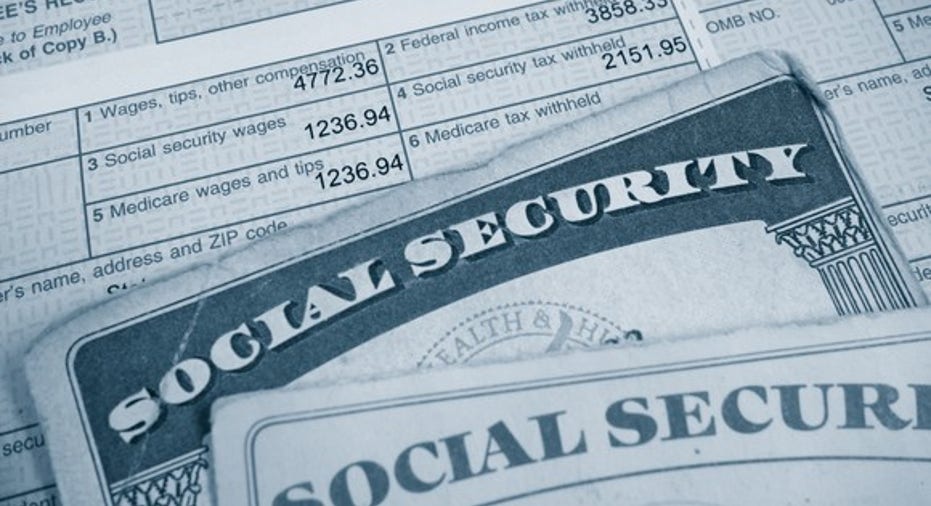Is the Social Security Payroll Tax Going To Rise?

The Social Security portion of the payroll tax is currently assessed at a rate of 6.2% on all earned income (wages, salary, tips, bonuses, and so on), up to a limit of $127,200 for 2017. However, it's important to be aware that there's a good chance the Social Security payroll tax will rise in the near future. Simply put -- Social Security needs more money if the program is going to be sustainable over the long run.
The Social Security payroll tax in 2017
The current Social Security payroll tax rate is 6.2%, which is assessed on both employees and their employers. So the total rate is 12.4% of earned income.
Image source: Getty Images.
However, there is a maximum amount of earned income that is taxed for Social Security. This wage cap is adjusted annually for inflation, and for 2017, the maximum taxable Social Security earnings limit is $127,200. Any earned income in excess of this amount is not taxable for Social Security purposes.
Why would the payroll tax rise?
In a nutshell, Social Security is going to run out of money within two decades, unless something is done to fix the system.
According to the latest report by the Social Security Trustees, the trust fund that holds Social Security's reserves had about $2.8 trillion in it at the end of 2015, and is actually expected to run a slight surplus for the next few years. However, starting in 2020, the program is expected to begin running a deficit, and will continue to do so for the foreseeable future.
You can read afull discussionof why deficits are expected, but the current projections call for Social Security to completely run out of reserves in 2034. After that point, the program will be able to pay only about three-fourths of its promised benefits.
There are only two ways to sustainably fix the problem -- benefit cuts or tax increases. Not only are benefit cuts highly unpopular, but the president has also said repeatedly that he is opposed to cutting Social Security.
Two ways the Social Security payroll tax could rise
There are two main possibilities when it comes to raising the Social Security payroll tax.
The most obvious would be an across-the-board increase - that is, raising the tax rate. For example, options that have been suggested are raising the Social Security tax rate by one percentage point, to 7.2%, and phasing the increase in over an extended period, such as a decade or two. According to a study by the National Academy of Social Insurance (NASI), this would take care of 52% of the Social Security funding gap all by itself.
Another way to increase the Social Security payroll tax would be to increase the wage cap, or eliminate it altogether. When Social Security was started, the wage base covered 90% of all earned income. Now, just 82% of wage income is taxed for Social Security, so there's certainly a case to be made in raising the wage cap. It's estimated that increasing the Social Security taxable wage cap to cover 90% of earnings (a limit of about $270,000) over a five-year period would correct 29% of the funding shortfall. Eliminating the wage cap completely would take care of 74% of the shortfall.
There are certainly other ways to increase Social Security's tax revenue. For example, it would be possible to raise Social Security payroll taxes only on employers, or only on employees. However, an across-the-board increase and raising the wage cap are by far the two that have been discussed the most. It's also possible that a combination of the two could happen, as neither would be enough to fix the funding shortfall all by itself.
Will it happen?
At this point, the Social Security reform package that Congress will eventually pass is anyone's guess. History indicates that something will be done -- it's just a question of what that will be.
Furthermore, not only has President Trump repeatedly promised not to cut Social Security benefits, but any form of benefit cuts would also be widely unpopular among the American people, including all age, political, and income groups. On the other hand, 79% of Americans are in favor of increasing Social Security taxes if it means they won't have to worry about Social Security benefits when they retire, according to the NASI study.
So while there's no way of predicting the future, it's fair to say that there's a very realistic possibility that the Social Security payroll tax will rise in the not-too-distant future.
The $16,122 Social Security bonus most retirees completely overlook If you're like most Americans, you're a few years (or more) behind on your retirement savings. But a handful of little-known "Social Security secrets" could help ensure a boost in your retirement income. For example: one easy trick could pay you as much as $16,122 more... each year! Once you learn how to maximize your Social Security benefits, we think you could retire confidently with the peace of mind we're all after.Simply click here to discover how to learn more about these strategies.
The Motley Fool has a disclosure policy.



















